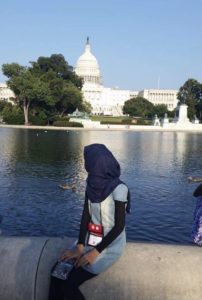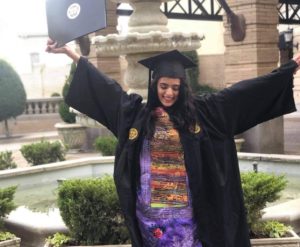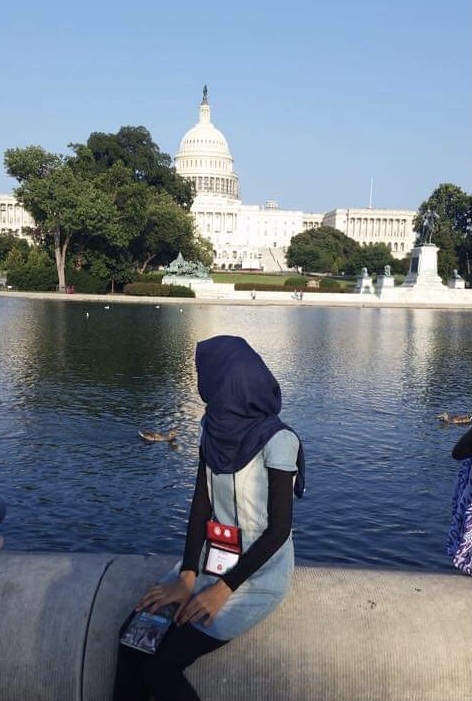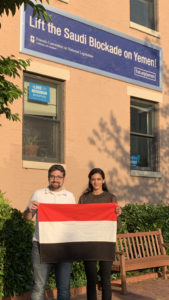How I Became Inspired to Work on Peace
Born and raised in Hodeidah, Yemen, I have grown up well aware of how political corruption affects the lives of millions of people. Poverty, injustice, and oppression existed around me for almost all my life. In my adolescence, civil unrest beset my country during the Arab Spring of 2011, and a few years later with Operation Decisive Storm on Yemen in 2015, led by Saudi Arabia and the United Arab Emirates. Because of me and my family’s lived experience of the war in our homeland, I felt it was important to understand how these decisions are made and how I can influence peacebuilding. One day, I hope I can use these new skills I’ve developed through the Scoville fellowship and contribute towards peacebuilding and reconciliation in my home country of Yemen and the wider Middle East and North Africa region.

Rassem’s first day in Washington, DC as an exchange student participating in the YES program in 2014.
I felt deeply fortunate to be selected to come to the United States as part of the Youth, Exchange, and Study (YES) program. I came to the US in 2014 and received my program orientation. Some of the most important stops on our orientation tour were the White House, the Capitol, and the Supreme Court. Seeing these sights— in addition to my mandatory American government and history classes— put in perspective how the United States international policies, have shaped our world at large.
Just before my planned return to Hodeidah, the US backed Saudi-led coalition started bombing Yemen on March 25th, 2015. Since then, I have been witnessing the atrocities that followed and that are still taking place today. As the humanitarian crisis has worsened, I have seen it destabilize the country as people started fleeing, resulting in a refugee crisis within and outside the country. As the conflict rages, the world witnessed a global pandemic, which has created an even greater humanitarian crisis in Yemen.

Rassem graduating with a bachelors in International Studies with a concentration International Social Justice from VCU.
The crisis in Yemen has deepened my desire to know how US foreign policy is shaped, and how me, as an advocate, can influence real change. I am also interested in international bodies like the United Nations, and how international cooperation contributes to the goal of peace and stability worldwide. In college, I majored in International Studies with a concentration in International Social Justice, with the goal of helping countries in conflict. I developed a deep desire for peace in my country, Yemen, and empathy for other countries facing insecurity and humanitarian crises.
Becoming a Scoville Fellow at the Friends Committee on National Legislation Education Fund was the perfect next step for me. I am now supporting FCNL’s lead Executive Branch lobbyist for Peacebuilding and Atrocity Prevention, Shukria Dellawar. Shukria also leads the Prevention and Protection Working Group (PPWG) hosted by FCNL. I have learned about multiple conflicts around the world and helped organize several educational briefings for the Biden Administration
My work during the Scoville fellowship has taught me the complexities of US foreign policy. Specifically, when it comes to peacebuilding around the world, there is a lot of work to be done to strengthen the US government’s mechanisms to build peace. For example, I have learned about the Global fragility Act and the Elie Wiesel Genocide and Atrocities Prevention Act. These legislations are building the ground for better peacebuilding and atrocity prevention policies. In addition, I have engaged with and learned from many civil society organizations that work on atrocity prevention and protecting civilians in conflict through helping coordinate the activities of PPWG coalition. The coalition has held several consultations with the Atrocity Early Warning Task Force on different conflicts. For its recommendations on Yemen, the members have highlighted prevention of violent conflict to promote peace, security and humanitarian assistance.
Inspired by the work of Hassan El-Tayyab, FCNL’s Legislative Director for Middle East policy, I have learned about grassroots lobbying efforts to end US participation and weapons sales supporting the Saudi-led coalition’s war and blockade on Yemen. He works alongside Yemeni-led coalition partners and civil society organizations across the country to convince Congress to pass the Yemen War Powers Resolution and Joint Resolutions of Disapproval to block arms sales to Saudi Arabia and the United Arab Emirates.
So far, my Scoville fellowship and work with PPWG has reinforced my belief in the importance of atrocity prevention and the power of bringing experts from impacted communities to conversations with policy makers. When the early warning signs of atrocities are ignored by policy makers, countless lives are put at risk, and the hope for swift reconciliation diminishes. I am currently working on an Ethiopia country-assessment for the Biden Administration. From my research, I know that thousands of people could have been spared from terrible fates, had the policy makers paid attention sooner to the early warning signs of atrocities in Ethiopia. Civil society can do something to impact change, prevent atrocities and contribute to peace through working with experts like Shukria and Hassan. I’m seeing first-hand how individuals and coalitions working together can influence real policy change. This inspired me to continue being part of this effort, to contribute to the prevention of violent conflicts and peacebuilding.
Asma Rassem is a Spring 2021 Scoville Fellow at the Friends Committee on National Legislation Education Fund.


